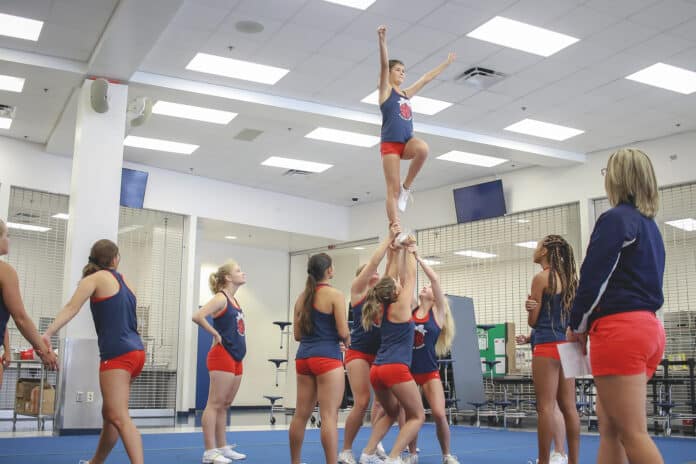The high school sports fall season is fast approaching, and for the next couple of weeks, the Eagles’ cheer team is working hard to fine-tune their sideline performances. With Shannon Herod on her fifth coaching season at Springstead, new and exciting crowd participation routines are in the works. The team picked up some new moves after a three-day cheer camp hosted by UCA (United Cheerleading Association) at the University of Florida in July.
“I always want to make sure we’re keeping up with the new transitions, new stunts and perfecting them,” Shannon said.
Cheerleaders are encouraged to be mentally and physically in shape but also know the importance of safety. There are a variety of stunts executed during squad performances and Shannon knows that mistakes can happen.
Shannon refers to herself as the product of a sports injury. She knows that whether you are a student or professional athlete, participating in any physical sport can be dangerous.
Her story began when she was a sixth-grade cheerleader. Not knowing that one of her teammates sprained her wrist earlier in the competition, during the pyramid formation, that teammate’s wrist broke while holding Shannon in an extended lib position. She fell and hit her head on the gym floor. It wasn’t until 15 years later, complications of that fall changed her life.
“We didn’t have rules and regulations as they do now in this sport,” Shannon said.
She continued to be active in playing sports throughout her high school years. At the age of 23, some symptoms of neurological concern surfaced during her pregnancy with her son. She started to experience blurred vision and hearing loss. Her doctor confirmed that a cavernous malformation had formed on her left temporal lobe. The cause of the cavernous malformation was the result of the fall she endured during that one cheerleading competition. The malformation constricted the flow of blood to the arteries in her brain. After the birth of her son, she had no other issues, and the doctor overseeing her didn’t recommend surgery at that time.
A year later, while enjoying a cookout with friends and family, her husband noticed something was off.
“We were sitting there, and my husband looked at me, he’s like are you okay, and I shrugged him off. He knew something was wrong,” she said. “I looked at him, and I can tell he was scared. I went to say I was fine, but all I could say was ‘red fire truck elephant.’ Then I realized what I was saying, and I couldn’t say the right words. I was getting frustrated.”
Her husband called 911.
“I can remember their faces of them being terrified,” Shannon said.
During her transfer to Tampa General, she was having multi-seizures. The possibility of receiving brain surgery to remove the cavernous malformation was held off due to her organs shutting down.
“For me, the best thing that happened was I don’t remember anything, which I am thankful for,” she said.
As soon as she was stable, the doctor explained the risks of undergoing brain surgery to Shannon’s husband and her family members. He said that she might need to relearn motor skills, like walking and eating.
“A week after my brain surgery, I was walking out of the hospital,” she said.
At twenty-five, Shannon was still recovering, two years after her surgery. She would still have mild seizures and short term memory loss.
February of 2019 marked ten years of being seizure-free.
“I deliver that story on my mat every year,” Shannon said. “In the sense of I am a product of a sports injury in two different ways. One how important it is and two communicate you have an injury. Because if you don’t communicate that you have an injury, you’re not the only one that can get injured.”
Shannon is grateful for all the support she had during that time of healing and made that her number one priority in coaching Springstead’s squad.
“I feel like Springstead has set a precedent of cheerleading. But I don’t know that everyone knows the hard work that goes into getting where we’re at,” she said.
Cheerleading season runs from April to February and it doesn’t stop at football games. Being a part of this squad requires dedication and commitment throughout the entire season. They all may be cheering from the sidelines during athletic games, but it’s much more than their presence at home or away games.
“We are the school’s spirit, so that is what we represent as sideline cheerleaders,” she said. “We are the ones spreading school spirit during the day, and we are the ones that they see under the lights.”

